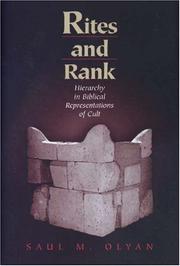| Listing 1 - 1 of 1 |
Sort by
|

ISBN: 0691029482 9786612753992 1400823560 1282753991 1400812879 9781400812875 9780691029481 9781400823567 Year: 2000 Publisher: Princeton, N.J. Princeton University Press
Abstract | Keywords | Export | Availability | Bookmark
 Loading...
Loading...Choose an application
- Reference Manager
- EndNote
- RefWorks (Direct export to RefWorks)
Good and evil, clean and unclean, rich and poor, self and other. The nature and function of such binary oppositions have long intrigued scholars in such fields as philosophy, linguistics, classics, and anthropology. From the opening chapters of Genesis, in which God separates day from night, and Adam and Eve partake of the tree of the knowledge of good and evil, dyadic pairs proliferate throughout the Hebrew Bible. In this groundbreaking work melding critical exegesis and contemporary theory, Saul M. Olyan considers the prevalence of polarities in biblical discourse and expounds their significance for the social and religious institutions of ancient Israel. Extant biblical narrative and legal texts reveal a set of socially constructed and culturally privileged binary oppositions, Olyan argues, which instigate and perpetuate hierarchical social relations in ritual settings such as the sanctuary. Focusing on four binary pairs--holy/common, Israelite/alien, clean/unclean, and whole/blemished--Olyan shows how these privileged oppositions were used to restrict access to cultic spaces, such as the temple or the Passover table. These ritual sites, therefore, became the primary contexts for creating and recreating unequal social relations. Olyan also uncovers a pattern of challenge to the established hierarchies by nonprivileged groups. Converging with contemporary issues of power, marginalization, and privileging, Olyan's painstaking yet lucid study abounds with implications for anthropology, classics, critical theory, and feminist studies.
Social stratification in the Bible. --- Worship in the Bible. --- Bible. --- Criticism, interpretation, etc. --- Social stratification in the Bible --- Sociale stratificatie in de Bijbel --- Statification sociale dans la Bible --- Verering in de Bijbel --- Vénération dans la Bible --- Worship in the Bible --- Cultes dans la bible --- Cultus, Jewish --- Antico Testamento --- Hebrew Bible --- Hebrew Scriptures --- Kitve-ḳodesh --- Miḳra --- Old Testament --- Palaia Diathēkē --- Pentateuch, Prophets, and Hagiographa --- Sean-Tiomna --- Stary Testament --- Tanakh --- Tawrāt --- Torah, Neviʼim, Ketuvim --- Torah, Neviʼim u-Khetuvim --- Velho Testamento --- 221.08*4 --- 221.08*4 Theologie van het Oude Testament: cultus --- Theologie van het Oude Testament: cultus --- Bible. Old Testament --- Criticism, interpretation, etc
| Listing 1 - 1 of 1 |
Sort by
|

 Search
Search Feedback
Feedback About
About Help
Help News
News